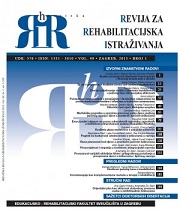Kvaliteta glasa nastavnica s vokalnim zamorom
Voice Quality of Female Teachers with Vocal Fatigue
Author(s): Gordana Kovačić, Emica FaragoSubject(s): Social Sciences
Published by: Sveučilište u Zagrebu, Edukacijsko-rehabilitacijski fakultet
Keywords: vocal fatigue; teachers; voice quality; perceptual voice assessment; GRBAS scale
Summary/Abstract: Functional weakness of the voice known as vocal fatigue is frequent among teachers. Vocal overdosing typical for their job is the chief etiologic factor in vocal fatigue. This study aims to explore the major subjective symptoms of vocal fatigue and, what is more important, to analyse the voice quality among teachers with vocal fatigue. Fifty female teachers were divided into teachers with vocal fatigue (experimental sample, N=23) and teachers without vocal fatigue (control sample, N=27). According to the hypothesis of the study there is statistically significant difference in voice quality evaluated by the GRBAS scale between the samples of teachers. It is expected that the experimental sample will show higher degrees of hoarseness G, roughenss R, breathiness B, asthenic voice A and strain S. The voice quality was subjectively evaluated by nine trained listeners (students of SLP). The results of multivariate analysis of variance showed significant difference in voice quality between the samples [F(5,44)=3,575; p=0,008]. Univariate analysis of variance confirmed so for hoarseness G and roughness R. Statistically significant discriminant function (p=0,008) was isolated by discriminative analysis, where hoarseness G, roughness R and strain S make largest contributions, the latter one in opposite direction. The hypothesis was confirmed. The voices of teachers with vocal fatigue showed to be more pathological, that is, with mild to mildly moderate hoarseness and mild roughness, while the voices of the controls were very mildly hoarse and barely noticeable rough. Both samples of teachers are having mild degree of breathiness and barely noticeable asthenic voice and strain. The most frequent subjective symptoms of vocal fatigue in experimental sample are hoarseness (70% of subjects), irritable coughing (61%), unpleasant feeling in throat and neck (48%), lowered pitch of the voice (43%) and dryness in the throat (39%). Roughly equal ratio of vocal and physical symptoms (2:2) with mild/mild to moderate hoarseness, as evaluated by perceptual voice assessment, is worrying because it suggests that the teachers with vocal fatigue might suffer from functional dysphonia.
Journal: Hrvatska revija za rehabilitacijska istraživanja
- Issue Year: 49/2013
- Issue No: 1
- Page Range: 92-107
- Page Count: 16
- Language: Croatian

